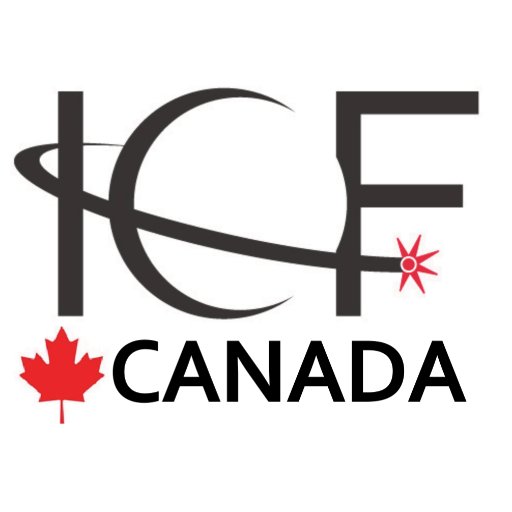ICF Canada Newsletter #31

Intelligent Community Forum (ICF) Canada Website:
www.icf-canada.com
Welcome to the 31th edition of ICF Canada’s Newsletter called iCommunity.ca. Click here to connect to the ICF Canada Website and an archive of past ICF Canada Newsletters.
The Internet of Cities
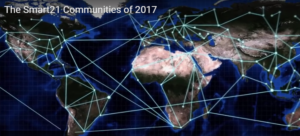
This year ICF is focusing on a new idea as its theme for the ICF Annual Summit from June 6-8 – the Internet of Cities. Cities are where transformation is happening at an unusual pace, especially with the convergence of the Internet of Things with the opportunities posed by 5G. Cities are also the drivers of change, where of innovation and creativity occur, where inclusion and circular economies take place and where cities are crucibles for experimentation and resiliency. Key areas that cities are investigating and investing in include autonomous vehicles, artificial intelligence, robotics, virtual reality, Internet of Things and smart city infrastructure. 5G will make all these more likely and possible sooner than we can imagine. As a result, cities and companies have quickened the pace for collaboration to be able to accommodate these transformative applications into their urban planning and design as well as into their long-range budgets to deal with issues related to sustainability and resiliency. How will this be accomplished?
Cities around the world are being challenged daily and must learn to communicate and share best practices in an urgent and efficient manner. Many cities cannot depend on their national governments for solutions. Instead, collaborative city-to-city engagement will be necessary and technology will certainly aid them in this regard. But change for people is among the hardest forms of transformation in communities, including: embracing and leveraging new technology; educating citizens to be able to use advances in technology and to adapt to new processes and procedures during this transformation; seeking ways to benefit from the innovation ecosystem that may emerge as a result of the effects of the transformation; ensuring all of the community members participate and benefit from this transformation; and developing sustainable long term plans and the budgets necessary to sustain the initiatives over the long term. All are strategies that involve the determination and actions of people, rather than the technology itself that will continue to change and evolve as well.
This is a key goal of the Intelligent Community movement – to ensure that technology by itself is not the focus of community transformation, but the decisions and actions of people during this transformation are equally considered, if not more important. People deciding to share best practices in fair and equitable ways may be at the heart of the new Internet of Cities. As the agoras of cities past may have been the original “internet of cities” using the markets and civic squares to be the vehicle through which ideas and goods and services were shared, today’s Internet is emerging as the key vehicle to exchange these same, although more advanced ideas, goods and services. However today, instead of a geographically limited agora or marketplace, this is able to be undertaken globally in new and exciting ways, from virtual reality to the application of artificial intelligence, aided by technological advances into the future. This will be accomplished by individuals acting locally as well as globally.
But sharing major solutions to common city issues takes on a different dimension, such as conceiving and undertaking major plans to address cybersecurity, dealing with emergencies and significant catastrophes in similarly configured cities, and managing for sustainability and resiliency. Like communications between and among machines and devices through the Internet of Things, collaborating among cities will need to take on a different form. Its most efficient and cost effective vehicle will likely become channels through which the future of the Internet of Cities can evolve. However, it will take champions in each city, such as mayors and other civic, institutional and private sector leaders to make this happen. Behind the Internet of Cities are the people.
Move over United Nations, a new kid is on the block. It’s cities!

The Internet of Cities will need to emerge as a new way to communicate, share and perhaps ultimately survive as we tackle some of the most important issues facing cities in the years to come. To learn more, come to the Intelligent Community Forum’s Annual Summit 2017 in New York City from June 6-8, 2017.
Join us at the ICF Summit 2017

The annual ICF Summit is unlike any municipal, urban planning or economic development conference you’ll ever attend. What will you take away from Summit 17? You will take away value that translates into direct benefit to the citizens, businesses and institutions you serve:
- Match-making Session June 6 – Gain valuable economic development leads among ICF Intelligent Communities. Identify site location and investment opportunities, as well as “soft landing” targets for local business, at our economic development matchmaking session.
- Share solutions. These are ideas you can put to use. Meet officials from cities, counties and regional areas who face similar challenges and have created strategies and programs to deal with them. Many may have developed solutions that apply to your community. Peer mentoring starts at the Summit and continues long after through the relationships you forge.
- Inspirational – and designed to inspire you to take action. Too often, efforts to build a better community wind up in an endless loop of meetings, analysis, workshops and more analysis. The inspiring examples you encounter at the ICF Summit show you how to take the first essential steps on the journey.
- International reach. The Summit is your most direct route to international opportunity in the innovation economy. Nobel Prize-winning economist Robert Solow has proven that 80% of economic growth comes from technology innovation. McKinsey & Company estimates that 80% of the world’s trade will cross international borders by 2027. Make your contacts here. Many others will and have benefitted from the past connections.
To register, click here.
ICF Program for Summit17


Key Events at the Annual Summit include:
· Urban and Rural Master Classes teaching development strategies based on information and communications technology.
· Economic Development Matchmaking for public and private-sector organizations seeking new opportunities.
· Welcome Reception: Learn about the ICF Nations
· Top7 Intelligent Communities Reception, honoring the finalists for the Intelligent Community Awards
· Top7 Conversations with the mayors and administrative leaders of our finalists
· Intelligent Community Awards Dinner, where one of the Top7 is named Intelligent Community of the Year
ICF Summit17 Speakers Announced

Speakers for the ICF Summit 2017 include:
- Mayor Paul Pisasale, City of Ipswich, Queensland, Australia
- Mayor Tom Roach, City of White Plains, New York, USA
- Mayor Shiing-Jer Twu, Chiayi City
- Mayor Alan Barfoot, Grey County
- Robert Bell, ICF Co-Founder
- Andrey Belozerov, Deputy CIO, Moscow City Government
- Susan Benton, President and CEO, Urban Libraries Council
- Carolyn Campbell, Deputy City Manager, Edmonton
- Moez Chaabouni, Local Government Account Executive, Informatica
- Bill Coleman, Founder, Community Technology Advisors,
- Meghan Cook, Program Director, Center for Technology in Government
- Roberto Gallardo, Associate Extension Professor, Mississippi State University; Founder, Intelligent Community Institute at Mississippi State
- Andres Henriquez, Vice President, STEM Learning in Communities, New York Hall of Science
- John Horrigan, Senior Researcher, Pew Research Center
- Norman Jacknis, Senior Fellow, Intelligent Community Forum
- Stu Johnson, Executive Director, Connect Ohio
- John G. Jung, ICF Chairman and Co-Founder
- Mary Lee Kennedy, Intelligent Community Strategist
- Gary Klassen, Deputy City Manager, Edmonton
- Chris Lawrence, Vice President, Mozilla Leadership Network
- Bruce Lincoln, Co-Founder & Chief Technology Officer, Silicon Harlem
- Rob McCann, President Clearcable Network
- Douglas McCollough, Chief Information Officer, City of Dublin, Ohio, USA
- Savanna Myers, Manager of Economic Development, Grey County
- Kim Wingrove, Chief Administrative Officer, Grey County
- Louis Zacharilla, ICF Co-Founder
And more to be announced…
To read more about each speaker, click here.
Canadian Speakers Bureau

Are you looking for a Canadian speaker to come to your community to inspire your community to take action on becoming a smart community? ICF Canada has launched a Speaker’s Bureau that will offer a wide variety of speakers for Canadian communities that are interested in hearing about smart cities, intelligent communities, collaborative networks, social inclusion, smart technologies, open data, innovation ecosystems, and other topics that the ICF Canada communities and its network of members may be able to cover. ICF Canada is also able to assist communities with access to International speakers, starting with ICF’s Co-Founders and Senior Fellows with their global experience and broad inspirational appeal. Community leaders from around the world can also be accessed through ICF Canada. To learn more about becoming a registered speaker or how to access one of the speakers, please contact Michael at [email protected]
Meet the Intelligent Community of Grey County, Ontario

Last month, the March edition of iCommunity.ca profiled Edmonton, Alberta, one of the two 2017 Top7 Intelligent Communities. Edmonton was also awarded ICF Smart21 recognition in 2008, 2009, 2015, and 2017. This month meet Grey County, Ontario – Canada’s other 2017 Top7 Intelligent Community. What’s it all about?
Grey County is part of the area to the north of the Greater Toronto Area, attracting many cottage owners, seniors and many tourists wanting to escape the urban areas of Ontario. It also has an established population focused on Manufacturing (11.3%); Retail Trade (11%) Construction (9.3%); Agriculture, Forestry, Fishing & Hunting (6.8%); and Accommodation & Food Services (6.5%). Its older population creates opportunities in the health and support services sector (13%) as demand for care for the elderly increases in Grey County. What’s really interesting is that the concentration of Grey County’s agricultural sector (which includes forestry, fishing, and hunting) is 6 times the Canadian national average and 4 times the Ontario average.
One of the key activities that helps to define its transformation is its special focus on an initiative called the Southwestern Integrated Fibre Technology (SWIFT) Network which will be developed to address major gaps and lack of fibre-optic broadband connectivity at a regional and rural level, especially where population densities are low. The development of SWIFT comes as a direct reaction to the fact that market forces alone will not meet the needs for improved connectivity inGrey County and the greater region. SWIFT’s program will direct funding from multiple government sources including municipal, provincial and federal governments, to address the gaps in broadband infrastructure and adding to the existing fibre in the area to create a much more far-reaching regional fibre network. For instance, $180 million in federal and provincial funding for SWIFT, announced last year, is expected to trigger private investment from ISPs, who will continue to own and operate their networks and deliver services directly to customers. The coverage extends to an area of 41,286 square kilometers and reaching a potential population of over 3.5 million people in Ontario. Grey County has been a critical driving force, champion and major enabler of this program through dedicating staff resources, and providing political support and empowerment to make a reality. SWIFT will help the region compete, connect and keep pace in a digital world by building an ultra-high-speed fibre optic regional broadband network for everyone in Southwestern Ontario and Niagara Region, connecting the entire region with service ranging from 1 Gbps up to 100 Gbps. As an ubiquitous, open access fibre network, SWIFT will provide service from Orillia to Windsor, including Niagara and Caledon, and will be owned and operated by service providers and supported through subsidies and oversight by the public sector.
Grey County has also been a key part in providing data for ongoing research about the economic impact of broadband availability and adoption in rural Ontario, serving as one of the first SWIFT partners to provide longitudinal data on broadband needs and utilization. This data was incorporated into the University of Guelph’s Rural and Regional Broadband Project. This involvement also ties into Grey County’s early leadership in the former Southwest Economic Alliance’s Intelligent Region study and the Smart+Connected Communities pilot study conducted by Cisco in Grey County, which was conducted in support of and collaboration with the early-stage development of the SWIFT feasibility study.
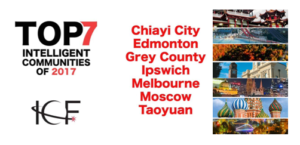
ICF Co-Founder Lou Zacharilla will travel to both Edmonton, Alberta and Grey County in Ontario prior to the announcement on June 8 of the Intelligent Community of the Year. He will be reviewing aspects of their application and learning more about their activities as Intelligent Communities. His reports will then be shared with an international jury, whose votes will be an important part of the final selection process leading to the Intelligent Community of the Year. Good Luck Edmonton and Grey County. Your competition this year is Melbourne and Ipswich, Australia; Chiayi City and Taoyuan in Taiwan; and Moscow. Come to the ICF Summit to meet these cities and witness who will win this year’s Intelligent Community of the Year: http://www.intelligentcommunity.org/summit_17
Check out ICF Canada’s New Website

ICF Canada’s brand new Website is now available to be viewed at www.icf-canada.com. Check out its new features including the new animation: “From Smart City to Intelligent Community”. ICF Canada’s new animation focuses on the story of the evolution of Smart Cities into Intelligent Communities. The animation was created specifically for the March 2017 launch of the new ICF Canada website. It is also available on YouTube: “From Smart City to Intelligent Community”.
Blog: Learning from Barcelona

Actually, Learning from Barcelona’s Mobile World Congress (2017)
The hype for 5G at the Mobile World Congress (MWC) 2017 in Barcelona was so thick it was palpable:
“Sir, do you realize that this is a revolution that will have a great impact on economies and in the quality of our everyday lives?”
“Excuse me Mister, but did you know that 5G will enable brand new services and things that have not been possible before?”
“Hello, can I offer you an Espresso? By the way, while commercialisation of 5G is not expected to start before 2020, our company is pushing other companies and governments to standardise norms for a smooth transition to 5G use worldwide. Is that with or without sugar?”
From 5G automated Jaguar cars to the promise at next year’s 2018 Pyeongchang Winter Olympics where South Korea’s KT mobile operator says it will engage tech savvy participants to enjoy their first holistic 5G experience, telecom firms clearly are racing to be the first on the block with 5G. Some are betting that 5G won’t be commercially available until at least 3-5 years from now, although some whisper that aggressive U.S. and South Korean firms are competing to get something out to customers by next year. Such intrigue. Can’t wait!
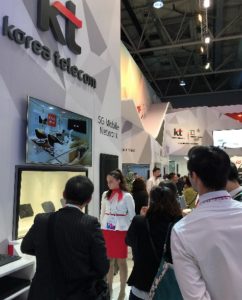
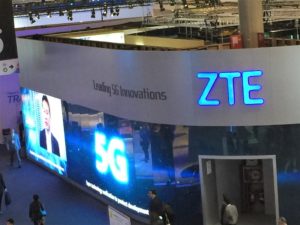
5G promotion at ZTE and Korean Telecom: Images: J. Jung
Fifth generation mobile networks were also on the lips of every Internet of Things (IoT) promoter and autonomous driving advocates as 5G is expected to enable lightning-quick downloads 1000 times faster than today’s 4G capabilities and help guide driverless cars by instantaneous multiple connections within a city’s traffic ecosystem. This was also the case at stands promoting digital health applications from wearables such Fitbit and Sony watches to scanning devices and other sensors to aid the old and easily confused, like me, at this event where they needed traffic flow monitors to assist in the movement of crowds of people traveling between booths and halls at MWC. Another evolutionary event this year was Virtual Reality with companies such as HTC’s Vive and Samsung’s VR rollercoaster ride attracting hundreds to their booths. Everything was considered life-altering and the next big, big thing, but speak to people experiencing the VR demonstrations, and you thought you already were in the year 2020.
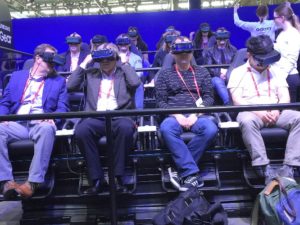

Samsung Virtual Reality Experience at Mobile World Congress, Barcelona 2017; Images: J. Jung
Granted, with 5G speeds promising to be 1,000 times faster than the 4G in my hands at the moment, the latest in mobile technology is exciting, especially at an event that attracts nearly 110,000 attendees in Barcelona every year. The buzz, euphoria and physical traffic of tens of thousands of people between halls at this event belies the myth that the likes of the Crystal Palace was dead. No way. And at registration prices in the thousands of dollars per person (sorry, no sharing!), the entry price is not keeping them away at the door.


Mobile World Congress 2017; Images: J. Jung
According to many attendees, Mobile World Congress in Barcelona is now the place to come to for the latest and greatest news about the mobile world. Not from the Internet nor from the media. In many cases, the exhibits were buildings, not booths. At 110,000 new citizens, it might even count as a new city, at least temporarily. Customers, agents and curious reporters will enter vast rooms with walls and ceilings around them, hiding from the passing delegates not blessed with this special privileged access, to witness the first showing of the new Samsung tablets, the latest Google concoction or gain access to the elite C-level executives at Huawei, ZTE and Siemens, among others.
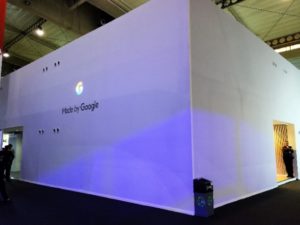
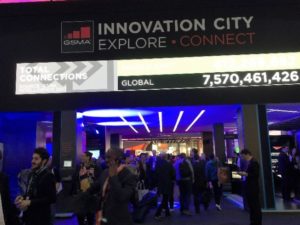
Google Box at MWC2017; Image: J. Jung GSMA’s Innovation City; Image: J.Jung
With your pass scanned at every turn, you are screened as either eligible to pass to view the next level of gadgets, speak to their business developers or asked to upgrade your pass, at a cost, to hear their select speakers at the Congress, such as Reed Hastings, Founder and CEO of NETFLIX, Ted Livingston, Founder & CEO of KIK, and Chang-Gyu Hwang, the Chairman and CEO of KT CORPORATION. Chrystal Palace, it ain’t, but the excitement of physically seeing, meeting and discovering these new things is probably the same.
Congratulations to GSMA, the organizers of MWC and their Innovation City initiative at the event. It was an experience worth going to.
But I was there on behalf of ICF Canada, speaking at an event associated with Mobile World, with a slightly different twist. In addition to promoting the cities of Canada as innovative communities in which to connect with, do business with and potentially leverage their unique intelligent communities from which to do business across North America, we were also discussing the impacts of all this new technology, good and bad, as we move toward an IoT world, enhanced by the future of 5G. What is the digital world doing to advance humanity? Attendees were interested in the evolution of smart cities where municipalities are partnering with tech companies to build a more efficient and cost-effective city that runs better. But they were also interested in communities that have the governance, champions and leadership to leverage this competitive advantage to attract and retain investment, innovation and talent, which are the key ingredients for a successful Intelligent Community. ICF Canada’s Intelligent Communities meet these criteria.
Imagine, a world as soon as 2020, where 5G will be commercially ubiquitous. Finally, you will be able to receive your Netflicks video in the furthest depths of a subway; you will be able to download and upload your latest heavy data projects 1000 times faster than today, anywhere and at anytime; and you will have the confidence of letting go of your steering wheel in your semi-autonomous car in real traffic as you eat your lunch in the driver’s seat. Some aspects of this new adventure in creating a better quality of life in your community will be more valuable than others, but clearly these are baby-steps in understanding what a more ubiquitous digital society will be all about. Unlike the commercial discussions of the MWC, our presentations covered a world that is susceptible to being hacked, legal
obstacles in a digitized world, as well as the opportunities about to emerge in a world that will have significant changes through advances in technology and community-wide acceptance of the promise of autonomous vehicles, artificial intelligence and robotics. Conference attendees of course were also aware that this transformation will not come easy. With it comes disruption and the impacts on lost jobs, lost dreams and the loss of pride for those who do not make the transformation at the same speed as the advances of technology. Keeping up with the technology is not easy, but is becoming mandatory. That is also why in some cases, broadband and related technologies have become an essential utility; and in some enlightened parts of the world, a human right. Equitable access to education and to affordable advanced technology, such as high speed broadband, are economic levelers that in some places are politically motivated, may be limited by geography or at the economic and business decision of service providers in a region. But in some cases, where adventurous champions and entrepreneurs are present, communities have taken it upon themselves to be self-reliant and establish their own innovative networks, smart initiatives and advanced intelligent communities programs. People want to hear these stories; learn the details through evidence-based data; become inspired that they too can achieve this transformation if they only try; and by understanding the best practices and case studies of others that have gone on before them, that they too might be able to have the insights to be able to make the decisions necessary for their communities to be globally competitive and to be able to attract and retain jobs and investment in their communities.
These are the stories that ICF and its ICF Nations, such as ICF Canada, and its Institutes tell everyday. It is through these best practices and case studies that many communities become inspired and make decisions to advance their communities. Many are no-name communities and some are even located in what some globally might consider to be in the middle of nowhere, such as Parkland County, Alberta; Ballarat, Victoria, Australia; or Mitchell, South Dakota. But each of these believed in themselves enough to become the little communities that thought they could become, and eventually did transform, to become better places that their citizens now fully enjoy and can effectively raise their families in and call home.
John G Jung, ICF Canada Executive Director
Events


Go to http://www.intelligentcommunity.org/summit and click on Sign Up.
For a more complete description, see http://www.intelligentcommunity.org/intelligent_community_forum_releases_internet_of_cities_special_report . The Intelligent Community Forum’s newly released special report, The INTERNET of CITIES explains the theme of the 2017 ICF Summit. See http://www.intelligentcommunity.org/internet_of_cities

http://globalforum.items-int.com

Toronto, Ontario
https://www.thinkcanada.org/welcome/think-canada-business-summit
Registration Now Open!
October 17, 2017 | Ottawa

Ottawa, Ontario
https://www.canadianinstitute.com/govconnect-canada-2017/apply-now/
Invest in Canada’s FDI Infographics:
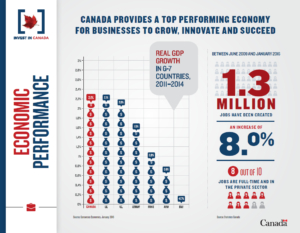
ICF Canada has been providing interesting infographics produced by Invest in Canada for the past few months. To view the entire lot, go to http://www.international.gc.ca/investors-investisseurs/assets/pdfs/download/Infographics.pdf . For a complete list of current publications, see: http://www.international.gc.ca/investors-investisseurs/iic-iac/publications.aspx?lang=eng
NEWS:
- Tesla makes inroads in Canada with new dealerships and charging stations
- Digital streaming is saving the music industry
- Millennials in the workplace
- Barcelona Interview
- Barcelona Interview #2
- Should Canadian internet service providers sell user data?
- Embrace the Cloud, Because It Isn’t Going Anywhere
- Tech Toys at Mobile World Congress
- Canadian tech IPO drought to end
- Rise of the machines: Bank of Canada warns of automation’s side effects
- The Emotional Stages Of Free Wi-Fi
- The 411 On Big Data: The Revolutionary Technology Explained
- CRTC declared Broadband internet access a basic service
- YouTube From Smart to Intelligent Community
![]()
![]()
Want to have a voice in iCommunity.ca, the official newsletter of ICF Canada? Please send your blogs, announcements and other interesting content to John G. Jung at [email protected]
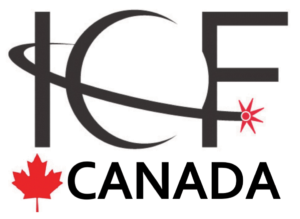
ICF Canada 1310-20 Bay Street Toronto, Ontario M5J 2N8 www.icf-canada.com
Contact: John G. Jung at [email protected] 1-647-801-4238 cell
Want to change how you receive these emails?
You can update your preferences or unsubscribe from this list
